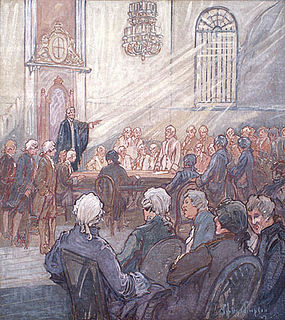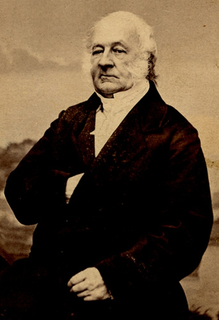Jean Bélanger (December 22, 1782 – August 21, 1827) was a notary and political figure in Lower Canada. He represented Quebec Lower Town in the Legislative Assembly of Lower Canada from 1820 to 1827.

Civil-law notaries, or Latin notaries, are agents of noncontentious private civil law who draft, take, and record instruments for private parties and are vested as public officers with the authentication power of the State. As opposed to most notaries public, their common-law counterparts, civil-law notaries are highly trained, licensed practitioners providing a range of regulated services, and whereas they hold a public office, they nonetheless operate usually—but not always—in private practice and are paid on a fee-for-service basis. They often receive the same education as attorneys at civil law but without qualifications in advocacy, procedural law, or the law of evidence, somewhat comparable to solicitor training in certain common-law countries.

The Province of Lower Canada was a British colony on the lower Saint Lawrence River and the shores of the Gulf of Saint Lawrence (1791–1841). It covered the southern portion of the current-day Province of Quebec, Canada, and the Labrador region of the modern-day Province of Newfoundland and Labrador.

The Legislative Assembly of Lower Canada was the lower house of the bicameral structure of provincial government in Lower Canada until 1838. The legislative assembly was created by the Constitutional Act of 1791. The lower house consisted of elected legislative councillors who created bills to be passed up to the Legislative Council of Lower Canada, whose members were appointed by the governor general.
He was born in Quebec City, the son of François Bélanger and Charlotte Delâge. Bélanger was commissioned as a notary in 1805 and practised in Quebec City until his death. He served as a captain in the militia during the War of 1812 and also was a justice of the peace. He was married twice: first to Reine Gauvreau in 1806 and then to Geneviève-Luce Robitaille in 1826. Bélanger died in office in Quebec City at the age of 44.

Quebec City, officially Québec, is the capital city of the Canadian province of Quebec. The city had a population estimate of 531,902 in July 2016, and the metropolitan area had a population of 800,296 in July 2016, making it the second largest city in Quebec after Montreal, and the seventh largest metropolitan area and eleventh largest city in the country.

The War of 1812 was a conflict fought between the United States, the United Kingdom, and their respective allies from June 1812 to February 1815. Historians in Britain often see it as a minor theater of the Napoleonic Wars; in the United States and Canada, it is seen as a war in its own right.

A justice of the peace (JP) is a judicial officer of a lower or puisne court, elected or appointed by means of a commission to keep the peace. In past centuries the term commissioner of the peace was often used with the same meaning. Depending on the jurisdiction, such justices dispense summary justice or merely deal with local administrative applications in common law jurisdictions. Justices of the peace are appointed or elected from the citizens of the jurisdiction in which they serve, and are usually not required to have any formal legal education in order to qualify for the office. Some jurisdictions have varying forms of training for JPs.




